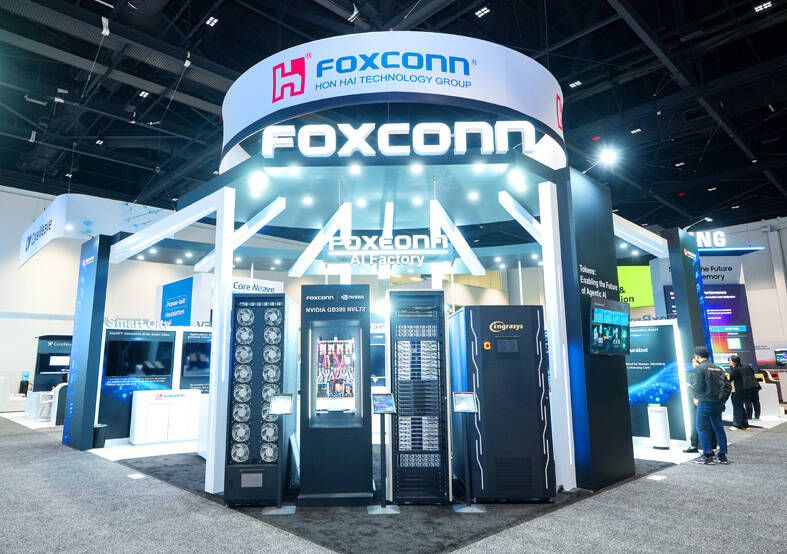Hon Hai Precision Industry Co (鴻海精密) expects server revenue to exceed its iPhone revenue within two years, with the possibility of achieving this goal as early as this year, chairman Young Liu (劉揚偉) said on Tuesday at Nvidia Corp’s annual technology conference in San Jose, California.
AI would be the primary focus this year for the company, also known as Foxconn Technology Group (富士康科技集團), as rapidly advancing AI applications are driving up demand for AI servers, Liu said.
The production and shipment of Nvidia’s GB200 chips and the anticipated launch of GB300 chips in the second half of the year would propel Hon Hai’s strong revenue growth, he said.

Photo courtesy of Hon Hai Precision Industry Co via CNA
Liu’s remarks came as the company showcased new AI server racks and other products at the weeklong GPU Technology Conference (GTC). He led a delegation of more than 70 engineers and executives to the event this year, doubling the size from last year. The company is among more than 20 Taiwanese companies joining this year’s GTC.
Hon Hai was the first of Nvidia’s AI server partners to display new-generation AI server racks at the event, with its GB300 NVL72 server rack featuring Nvidia’s new Blackwell Ultra graphics processing units, 36 of Nvidia’s Grace central processing units, advanced superchip ecosystems, liquid cooling technology and Nvidia’s Omniverse digital twin technology.
The company’s subsidiary Ingrasys Technology Inc (鴻佰科技) is supplying the new liquid cooling solutions to AI server racks equipped with GB300 chips, it said.
Hon Hai, which Liu said is currently the world’s largest AI server supplier, is ramping up production of those high-end servers based on Nvidia's GB200 chips after starting small-volume production in December last year.
At the event, the company also showcased several automated machines, including hybrid robots that integrate high-end visual recognition, and precision motion technologies that support the semiconductor industry and automation needs.
The company’s AI nursing robot, Nurabot, made its debut at the GTC. Nurabot is designed to optimize medical workflows and enhance patient care, Hon Hai said.
The robot would first enter service at Taichung Veterans General Hospital and in the company’s partner hospitals in Taiwan later this year, it said.
In addition to Hon Hai, Wiwynn Corp (緯穎) showcased a series of new servers based on Nvidia’s GB300 NVL72 in collaboration with its parent company, Wistron Corp (緯創).
Wiwynn is one of the first electronics makers to supply GB200 NVL 72 server racks, the company said.
Wiwynn also demonstrated new AI servers running on Nvidia’s HGX B300 NVL 16, as well as a direct liquid cooling rack, the company said.
Meanwhile, Asustek Computer Inc (華碩) exhibited new AI pods, server racks equipped with Nvidia’s GB300 NVL72, and servers running on Nvidia B200 NVL8 and HGX H200 chips.
The company has secured orders for the new AI pods, it said.
Additional reporting by CNA

NOT JUSTIFIED: The bank’s governor said there would only be a rate cut if inflation falls below 1.5% and economic conditions deteriorate, which have not been detected The central bank yesterday kept its key interest rates unchanged for a fifth consecutive quarter, aligning with market expectations, while slightly lowering its inflation outlook amid signs of cooling price pressures. The move came after the US Federal Reserve held rates steady overnight, despite pressure from US President Donald Trump to cut borrowing costs. Central bank board members unanimously voted to maintain the discount rate at 2 percent, the secured loan rate at 2.375 percent and the overnight lending rate at 4.25 percent. “We consider the policy decision appropriate, although it suggests tightening leaning after factoring in slackening inflation and stable GDP growth,”

DIVIDED VIEWS: Although the Fed agreed on holding rates steady, some officials see no rate cuts for this year, while 10 policymakers foresee two or more cuts There are a lot of unknowns about the outlook for the economy and interest rates, but US Federal Reserve Chair Jerome Powell signaled at least one thing seems certain: Higher prices are coming. Fed policymakers voted unanimously to hold interest rates steady at a range of 4.25 percent to 4.50 percent for a fourth straight meeting on Wednesday, as they await clarity on whether tariffs would leave a one-time or more lasting mark on inflation. Powell said it is still unclear how much of the bill would fall on the shoulders of consumers, but he expects to learn more about tariffs

Greek tourism student Katerina quit within a month of starting work at a five-star hotel in Halkidiki, one of the country’s top destinations, because she said conditions were so dire. Beyond the bad pay, the 22-year-old said that her working and living conditions were “miserable and unacceptable.” Millions holiday in Greece every year, but its vital tourism industry is finding it harder and harder to recruit Greeks to look after them. “I was asked to work in any department of the hotel where there was a need, from service to cleaning,” said Katerina, a tourism and marketing student, who would

i Gasoline and diesel prices at fuel stations are this week to rise NT$0.1 per liter, as tensions in the Middle East pushed crude oil prices higher last week, CPC Corp, Taiwan (台灣中油) and Formosa Petrochemical Corp (台塑石化) said yesterday. International crude oil prices last week rose for the third consecutive week due to an escalating conflict between Israel and Iran, as the market is concerned that the situation in the Middle East might affect crude oil supply, CPC and Formosa said in separate statements. Front-month Brent crude oil futures — the international oil benchmark — rose 3.75 percent to settle at US$77.01